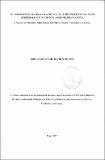An Assessment of Organizational Factors Influencing Staff Performance in County Assemblies in Kenya

View/
Date
2017-05Author
Eric, Stanley Muthuri Nthumbi
Type
ThesisLanguage
enMetadata
Show full item recordAbstract
ABSTRACT
The purpose of this research was to establish the factors affecting staff performance in devolved government. The study was based on the following objectives: to establish the effects of training on staff outcome, to find out the effects of politics on staff performance, to investigate the effects ofleadership in accordance with staff performance and to establish the effect of institution support in regards to worker job-performance in Tharaka Nithi, Embu and Meru County Assemblies. The study was formed in aligmnent with human capital theory , Adams (1963) Equity Theory, Spillover Approach and Work-Family Enrichment' (WFE) theory. This study used a survey study form of research design. The target population for the study was all the 183 permanent and pensionable staff members of the Tharaka Nithi, Embu and Meru county assemblies, in all the 9 departments of each assembly. All the workers excluding the MCAs were purposively sampled for the study. The study utilized a questionnaire for the staff. The content validity of the instruments was determined through the help of the research supervisor. Before the actual data collection, the researcher tested the instruments using a test-retest technique and tested the results using Cronbach Alpha method. The researcher sought an introductory letter from Kenya Methodist University and further applied and obtained a research permit from National Commission for Science, Technology and Innovations. The data was analysed using 'Statistical Package for Social Sciences' (SPSS) Version 21 for windows. Pearson product moment analysis was applied to establish if there was relationship between the dependent and the independent variables. Qualitative data obtained from the interview was analysed and discussed thematically. This data was used for the reinforcement of the quantitative findings, and to offer an elaboration about the obtained concepts. Quantitative analysis involves the analyzing of numbers about a situation by choosing specific aspects, which are associated with situation. Descriptive statistics was used to analyze the quantitative data obtained. The study established that the level of staff training had a positive influence on worker job-performance in the county assemblies, particularly, in the echelons of skilled sectors. However, it can further be concluded that some chores depended less on technical training; hence the training was not significant. The study further concludes that the politics had a negative influence on the staff work performance in the county assemblies, where the politicians tried to dictate their ways and wills to the workers of the county assemblies, through their influence. The study concludes that the leadership styles that were applied in the county assemblies were not fully effective in enhancing the staff work performance, as the majority of the workers felt dissatisfied with the leadership styles applied. The institution support provided to the workers by the county assemblies had a positive influence on worker performance, and overall effectiveness of the institutions. Based on the findings of the study, the researcher recommends that; the human resource managers should allocate substantial budgetary funds so as to facilitate worker training, which enhances skill development towards work performance, effectiveness of feedback services, and service delivery. The Hon Speakers of the respective county assemblies should ensure that there are minimum influences of political interference between the politicians and workers. The top management of the county assemblies should be taken for leadership trainings concerning the emerging issues in the management sectors and the devolved governance.
Publisher
KeMU
Description
HF 5438 .N74 2017
